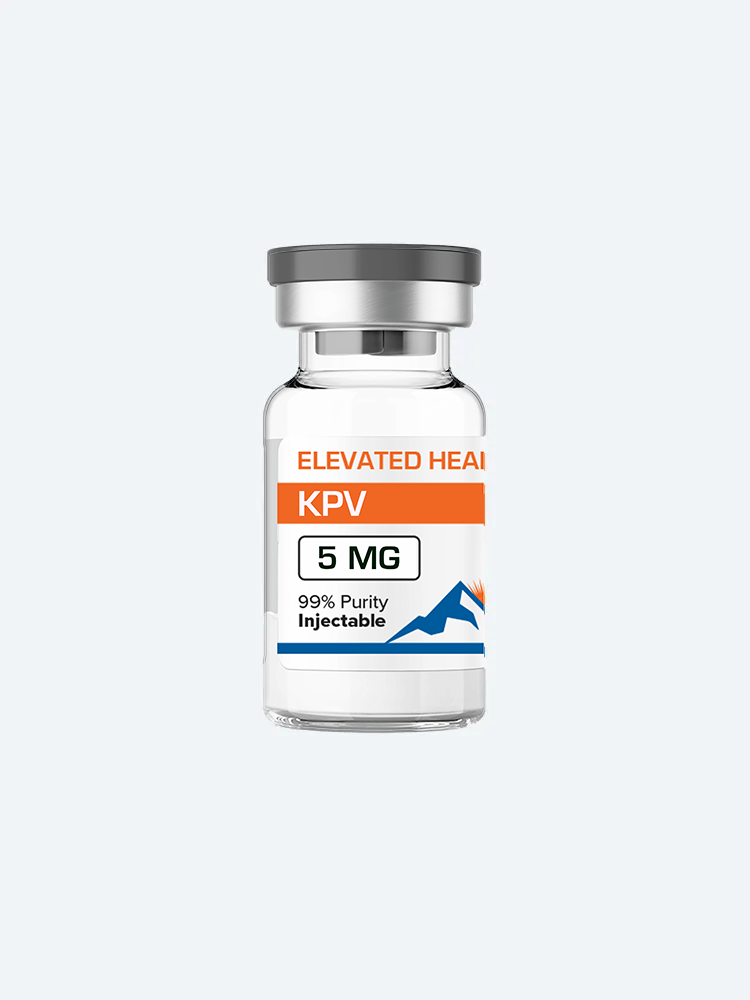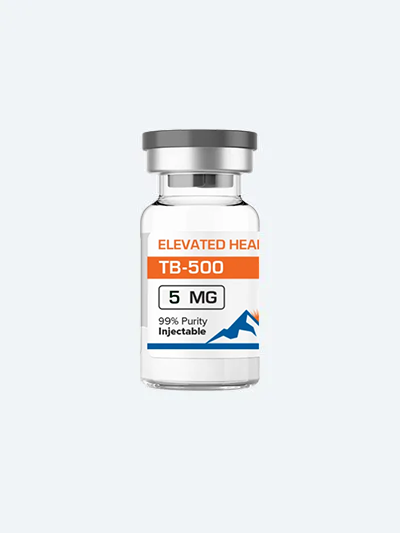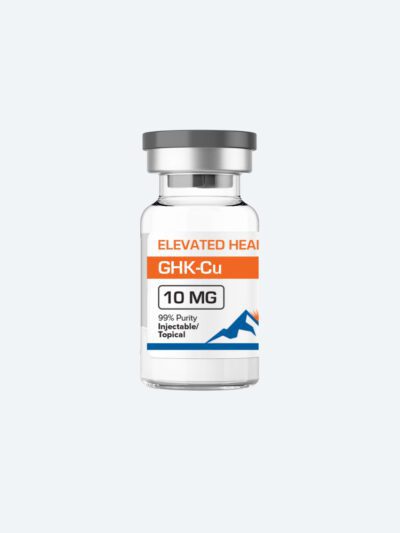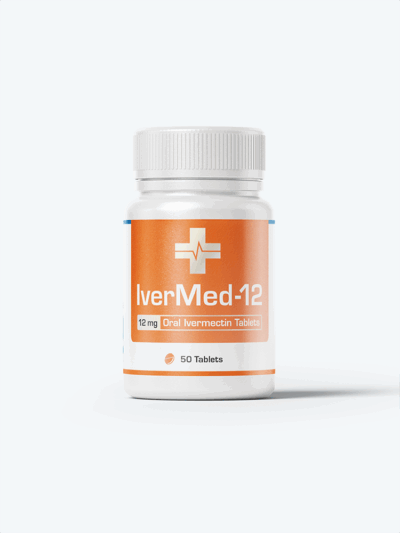
KPV
Anti-Inflammatory, Anti-Viral, Immune Boosting, Peptides$60.00
5mg Injectable Peptide
Composition – 5mg KPV Peptide
Indications – Anti-inflammatory, heals inflammatory bowel disorders, antimicrobial, wound healing
Dosage – 200-400mcgs daily via injection or nasal spray
KPV is the C-terminal peptide fragment of alpha-melanocvte stimulating hormone (alpha-MSH), which is made up of lysine-proline-valine. It has shown evidence of potent anti-inflammatory activity in the central nervous system, GI tract, lungs, vascular system, and joints. The most active research is in the treatment of inflammatory bowel disease where the peptide has showed substantial promise.
Research in wound healing also reveals that KPV and other alpha-MSH derivatives may offer a host of benefits that speed wound healing, reduce infection, fight inflammation, and lead to better cosmetic results. KPV and similar peptides should become mainstays not just in wound healing, but in scar reduction following surgery.
-
Description
Intestinal Inflammation
Perhaps the most important discovery to arise from KPV research is the finding that the peptide reduces intestinal intlammation. in mouse models of intlammatory bowel disease (IBD), KPV shows robust results, reducing inflammatory infiltrates, MPO activity, and overall histological evidence of inflammation. Mice treated with KPV in the study recovered taster and had more pronounced weight gain than mice treated with placebo.A study was conducted on a cell culture of inflamed intestinal cells. Inflamed intestinal cells were isolated and exposed to either the KPV peptide or a placebo. Upon exposure to KPV, these cells were examined, and results indicated that even nanomolar concentrations of the peptide appeared to have led to anti-inflammatory results. The researchers suggested that the KPV peptide appeared to mainly act via PepT1 expression in these intestinal cells, suggesting that PepT1 may play a role in transporting the peptide to the site of inflammation.
The potential of KPV in addressing ulcerative inflammation of the colonic mucosa cells, researchers have hypothesized that KPV might mitigate inflammatory responses within colonic cells, by accelerating mucosal healing and alleviating inflammation of the colonic mucosa. The action mechanism was suggested to involve the targeted delivery of KPV to inflamed colonic tissues, where it may exert anti-inflammatory potential. The researchers found that KPV may have exhibited a capacity to protect mucosal surfaces and downregulate TNF-α, a key marker of inflammation.
KPV Peptide and Wound Healing
Wound healing is a complex biological process comprised of three general phases: inflammation, proliferation, and remodeling of the skin, tissue, or cells. This process is characterized by different types of cells and concentrations of cytokines in the wounded area. Though every wound and associated cells affected by the wound may differ, most cells possess a melanocortin 1 receptor (MC1R) receptor. This receptor is where the a-MSH hormone binds, and researchers suggest that a-MSH hormone analogs, such as KPV peptide, may also bind to these receptors.
KPV may also enhance corneal epithelial wound healing with a particular focus on the possible involvement of nitric oxide (NO) in these actions. Research findings suggest a potential acceleration in the healing process in corneal tissues compared to placebo. Specifically, within 60 hours, all corneas exposed to KPV appeared to have complete re-epithelialization, a stark contrast to the placebo group, where none of the corneas appeared to have achieved full healing.
Because these alpha-MSH derivatives retain some of the properties of alpha-MSH, but lack others, they offer potential benefits in wound healing. For instance, KPV offers the inflammatory properties of alpha-MSH, but lacks the pigment-inducing activity of its parent peptide. This makes KPV a good candidate for improving wound healing while avoiding the skin-changing characteristics often associated with natural scar formation (a phenomenon disproportionately affecting darker-skinned individuals).
One of the reasons that KPV is anti-inflammatory is that it participates in the innate immune response against two common skin pathogens. Research shows that KPV inhibits the growth of both Staphylococcus aureus and Candida albicans. These benefits occur at physiological concentrations, meaning that KPV could provide an effective means of preventing infection in the setting of serious wounds like burns. This benefit of KPV is in contrast to other anti-inflammatory medications that actually inhibit the abilitv of the body to fight off infection. Thus. KPV combines anti-inflammatory activity with antimicrobial activity.
KPV as a General Anti-Inflammatory
As far back as 1984. research in rabbits revealed that KPV is a powerful anti-inflammatory and fever reducer (anti-pyretic). In this setting, however, KPV had lower potency than the full alpha-MSH molecule. This suggested to scientists at the time that KPV was lacking some portion of the alpha-MSH molecule necessary for full anti-pvretic activity. What ensued was decades of research investigating various modified forms of alpha-MSH.
Perhaps the biggest lesson learned from these tests is that alpha-MSH and several of its analogues all reduce inflammation in a wide variety of disease. So far, the molecules have been tested in fever. irritant and allergic contact dermatitis, vasculitis. fibrosis arthritis and inflammation of the eyes, brain, lungs, and gastrointestinal tract. In all cases, alpha-MSH is the most effective anti-inflammatory. Unfortunately, it suffers from one major side effect – it causes skin pigmentation. KPV, on the other hand, does not have this side effect. And even though KPV is not as potent as the intact alpha-MSH, its lack of side effects means that boosting levels to achieve desired target effects is theoretically possible in most cases.
The difference in potency has been found to be minimal, at best, as the majority of anti-inflammatory effects of alpha-MSH are, in fact, due to the KPV section. What is interesting. however. is that the parent molecule appears to be better at suppressing late stage inflammatory reaction. In the case of contact dermatitis, for instance, alpha-MSH does a better job of preventing an allergic inflammatory response at 2 weeks post initial exposure. This suggests that alpha-MSH may be affecting some aspect of immune modulation that is separate from the immediate inflammatory response. Work is still being done to determine what this process is.
References
Hiltz, M. E., & Lipton, J. M. (1989). Antiinflammatory activity of a COOH-terminal fragment of the neuropeptide alpha-MSH. FASEB Journal, 3(11), 2282–2284. https://pubmed.ncbi.nlm.nih.gov/2550304/
Kannengiesser, K., et al. (2008). Melanocortin-derived tripeptide KPV has anti-inflammatory potential in murine models of inflammatory bowel disease. Inflammatory Bowel Diseases, 14(3), 324–331. https://doi.org/10.1002/ibd.20334
Xiao, B., et al. (2017). Orally targeted delivery of tripeptide KPV via hyaluronic acid-functionalized nanoparticles efficiently alleviates ulcerative colitis. Molecular Therapy, 25(7), 1628–1640. https://doi.org/10.1016/j.ymthe.2016.11.020
Dalmasso, G., Charrier-Hisamuddin, L., Nguyen, H. T. T., Yan, Y., Sitaraman, S., & Merlin, D. (2008). PepT1-mediated tripeptide KPV uptake reduces intestinal inflammation. Gastroenterology, 134(1), 166–178. https://doi.org/10.1053/j.gastro.2007.10.026
Richards, D. B., & Lipton, J. M. (1984). Effect of alpha-MSH 11-13 (lysine-proline-valine) on fever in the rabbit. Peptides, 5(4), 815–817. https://doi.org/10.1016/0196-9781(84)90027-5
Brzoska, T., Luger, T. A., Maaser, C., Abels, C., & Böhm, M. (2008). Alpha-melanocyte-stimulating hormone and related tripeptides: Biochemistry, anti-inflammatory and protective effects in vitro and in vivo, and future perspectives for the treatment of immune-mediated inflammatory diseases. Endocrine Reviews, 29(5), 581–602. https://doi.org/10.1210/er.2007-0027
Luger, T. A., & Brzoska, T. (2007). Alpha-MSH related peptides: A new class of anti-inflammatory and immunomodulating drugs. Annals of the Rheumatic Diseases, 66(Suppl 3), iii52–iii55. https://doi.org/10.1136/ard.2007.079780
Cutuli, M., Cristiani, S., Lipton, J. M., & Catania, A. (2000). Antimicrobial effects of alpha-MSH peptides. Journal of Leukocyte Biology, 67(2), 233–239. https://doi.org/10.1002/jlb.67.2.233
Masman, M. F., et al. (2006). Synthesis and conformational analysis of His-Phe-Arg-Trp-NH2 and analogues with antifungal properties. Bioorganic & Medicinal Chemistry, 14(22), 7604–7614. https://doi.org/10.1016/j.bmc.2006.07.007
de Souza, K. S., et al. (2015). Improved cutaneous wound healing after intraperitoneal injection of alpha-melanocyte-stimulating hormone. Experimental Dermatology, 24(3), 198–203. https://doi.org/10.1111/exd.12609
Lonati, C., et al. (2013). Modulatory effects of NDP-MSH in the regenerating liver after partial hepatectomy in rats. Peptides, 50, 145–152. https://doi.org/10.1016/j.peptides.2013.10.014
Colombo, G., et al. (2005). Gene expression profiling reveals multiple protective influences of the peptide alpha-melanocyte-stimulating hormone in experimental heart transplantation. Journal of Immunology, 175(5), 3391–3401. https://doi.org/10.4049/jimmunol.175.5.3391
Colombo, G., et al. (2007). Production and effects of alpha-melanocyte-stimulating hormone during acute lung injury. Shock, 27(3), 326–333. https://doi.org/10.1097/01.shk.0000239764.80033.7e
Schiller, M., et al. (2001). Human dermal fibroblasts express prohormone convertases 1 and 2 and produce proopiomelanocortin-derived peptides. Journal of Investigative Dermatology, 117(2), 227–235. https://doi.org/10.1046/j.0022-202x.2001.01412.x
Brzoska, T., Böhm, M., Lügering, A., Loser, K., & Luger, T. A. (2010). Terminal signal: Anti-inflammatory effects of alpha-melanocyte-stimulating hormone-related peptides beyond the pharmacophore. Advances in Experimental Medicine and Biology, 681, 107–116. https://doi.org/10.1007/978-1-4419-6354-3_8
Getting, S. J., Schiöth, H. B., & Perretti, M. (2003). Dissection of the anti-inflammatory effect of the core and C-terminal (KPV) alpha-melanocyte-stimulating hormone peptides. Journal of Pharmacology and Experimental Therapeutics, 306(2), 631–637. https://doi.org/10.1124/jpet.103.051623
Pawar, K., Kolli, C. S., Rangari, V. K., & Babu, R. J. (2017). Transdermal iontophoretic delivery of lysine-proline-valine (KPV) peptide across microporated human skin. Journal of Pharmaceutical Sciences, 106(7), 1814–1820. https://doi.org/10.1016/j.xphs.2017.03.017
Dalmasso, G., Charrier-Hisamuddin, L., Nguyen, H. T., Yan, Y., Sitaraman, S., & Merlin, D. (2008). PepT1-mediated tripeptide KPV uptake reduces intestinal inflammation. Gastroenterology, 134(1), 166–178. https://doi.org/10.1053/j.gastro.2007.10.026
Hiltz ME, Lipton JM. Antiinflammatory activity of a COOH-terminal fragment of the neuropeptide alpha-MSH. FASEB J. 1989 Sep;3(11):2282-4. https://pubmed.ncbi.nlm.nih.gov/2550304/
Brzoska T, Luger TA, Maaser C, Abels C, Böhm M. Alpha-melanocyte-stimulating hormone and related tripeptides: biochemistry, antiinflammatory and protective effects in vitro and in vivo, and future perspectives for the treatment of immune-mediated inflammatory diseases. Endocr Rev. 2008 Aug;29(5):581-602. doi: 10.1210/er.2007-0027. Epub 2008 Jul 8. https://pubmed.ncbi.nlm.nih.gov/18612139/
Klaus Kannengiesser, MD, Christian Maaser, MD, Jan Heidemann, MD, Andreas Luegering, MD, Matthias Ross, MD, Thomas Brzoska, PhD, Markus Bohm, MD, Thomas A. Luger, MD, Wolfram Domschke, MD, Torsten Kucharzik, MD, Melanocortin-derived tripeptide KPV has anti-inflammatory potential in murine models of inflammatory bowel disease, Inflammatory Bowel Diseases, Volume 14, Issue 3, 1 March 2008, Pages 324–331, https://doi.org/10.1002/ibd.20334
Dalmasso G, Charrier-Hisamuddin L, Nguyen HT, Yan Y, Sitaraman S, Merlin D. PepT1-mediated tripeptide KPV uptake reduces intestinal inflammation. Gastroenterology. 2008 Jan;134(1):166-78. https://pubmed.ncbi.nlm.nih.gov/18061177/
Xiao, B., Xu, Z., Viennois, E., Zhang, Y., Zhang, Z., Zhang, M., Han, M. K., Kang, Y., & Merlin, D. (2017). Orally Targeted Delivery of Tripeptide KPV via Hyaluronic Acid-Functionalized Nanoparticles Efficiently Alleviates Ulcerative Colitis. Molecular therapy : the journal of the American Society of Gene Therapy, 25(7), 1628–1640. https://doi.org/10.1016/j.ymthe.2016.11.020
Kannengiesser K, Maaser C, Heidemann J, Luegering A, Ross M, Brzoska T, Bohm M, Luger TA, Domschke W, Kucharzik T. Melanocortin-derived tripeptide KPV has anti-inflammatory potential in murine models of inflammatory bowel disease. Inflamm Bowel Dis. 2008 Mar;14(3):324-31. doi: 10.1002/ibd.20334. PMID: 18092346.
D.B. Richards, J.M. Lipton, Effect of α-MSH 11–13 (lysine-proline-valine) on fever in the rabbit, Peptides, Volume 5, Issue 4, 1984, Pages 815-817, ISSN 0196-9781, https://doi.org/10.1016/0196-9781(84)90027-5
Luger, T. A., & Brzoska, T. (2007). alpha-MSH related peptides: a new class of anti-inflammatory and immunomodulating drugs. Annals of the rheumatic diseases, 66 Suppl 3(Suppl 3), iii52–iii55. https://www.ncbi.nlm.nih.gov/pmc/articles/PMC2095288/#!po=3.33333
Brzoska T, Luger TA, Maaser C, Abels C, Böhm M. Alpha-melanocyte-stimulating hormone and related tripeptides: biochemistry, antiinflammatory and protective effects in vitro and in vivo, and future perspectives for the treatment of immune-mediated inflammatory diseases. Endocr Rev. 2008 Aug;29(5):581-602. https://pubmed.ncbi.nlm.nih.gov/18612139/
Bonfiglio V, Camillieri G, Avitabile T, Leggio GM, Drago F. Effects of the COOH-terminal tripeptide alpha-MSH(11-13) on corneal epithelial wound healing: role of nitric oxide. Exp Eye Res. 2006 Dec;83(6):1366-72. doi: 10.1016/j.exer.2006.07.014. Epub 2006 Sep 11. PMID: 16965771.
de Souza KS, Cantaruti TA, Azevedo GM Jr, Galdino DA, Rodrigues CM, Costa RA, Vaz NM, Carvalho CR. Improved cutaneous wound healing after intraperitoneal injection of alpha-melanocyte-stimulating hormone. Exp Dermatol. 2015 Mar;24(3):198-203. https://pubmed.ncbi.nlm.nih.gov/25431356/
REMINDER TO ALL CUSTOMERS:
Due to their sensitive nature and strict storage requirements: all sales are final on peptides & GH products. We cannot accept returns strictly because of product integrity and safety for all clients. Thank you for your understanding
Related products
-
TB-500, 5mg, 3 Pack
$240.00Original price was: $240.00.$216.00Current price is: $216.00. -
GHK-Cu, 50mg$70.00
-
IverMed-12, 50 Tablets, 20 Pack
$2,720.00Original price was: $2,720.00.$1,980.00Current price is: $1,980.00.






